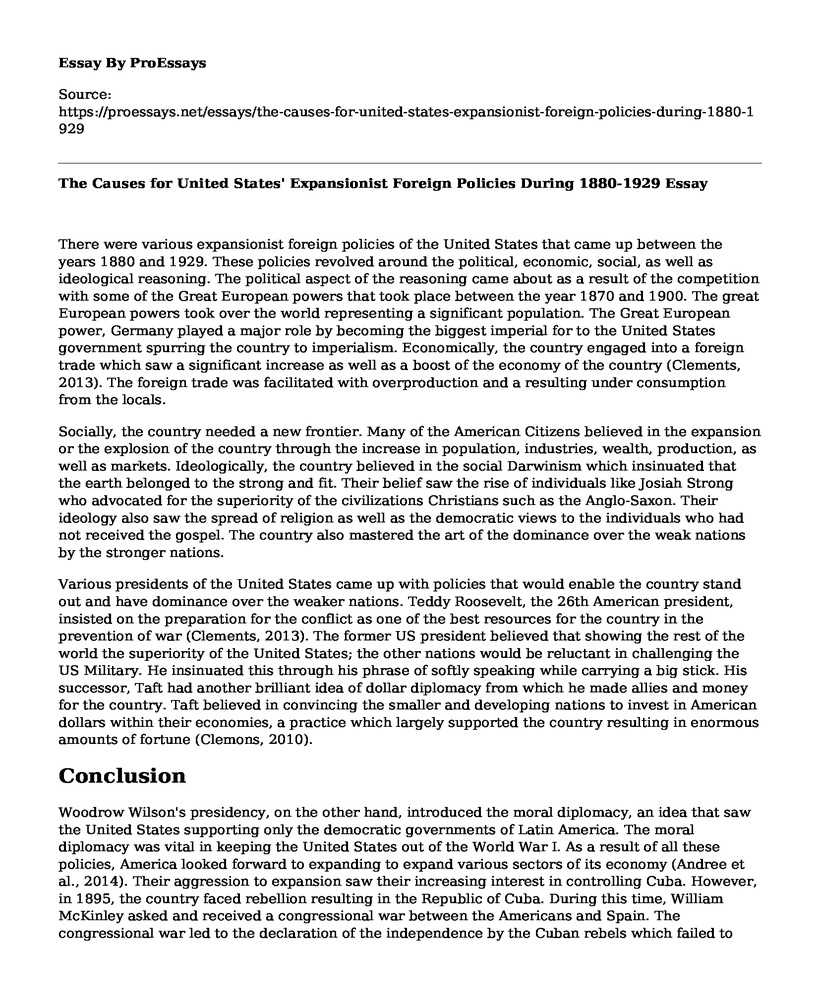There were various expansionist foreign policies of the United States that came up between the years 1880 and 1929. These policies revolved around the political, economic, social, as well as ideological reasoning. The political aspect of the reasoning came about as a result of the competition with some of the Great European powers that took place between the year 1870 and 1900. The great European powers took over the world representing a significant population. The Great European power, Germany played a major role by becoming the biggest imperial for to the United States government spurring the country to imperialism. Economically, the country engaged into a foreign trade which saw a significant increase as well as a boost of the economy of the country (Clements, 2013). The foreign trade was facilitated with overproduction and a resulting under consumption from the locals.
Socially, the country needed a new frontier. Many of the American Citizens believed in the expansion or the explosion of the country through the increase in population, industries, wealth, production, as well as markets. Ideologically, the country believed in the social Darwinism which insinuated that the earth belonged to the strong and fit. Their belief saw the rise of individuals like Josiah Strong who advocated for the superiority of the civilizations Christians such as the Anglo-Saxon. Their ideology also saw the spread of religion as well as the democratic views to the individuals who had not received the gospel. The country also mastered the art of the dominance over the weak nations by the stronger nations.
Various presidents of the United States came up with policies that would enable the country stand out and have dominance over the weaker nations. Teddy Roosevelt, the 26th American president, insisted on the preparation for the conflict as one of the best resources for the country in the prevention of war (Clements, 2013). The former US president believed that showing the rest of the world the superiority of the United States; the other nations would be reluctant in challenging the US Military. He insinuated this through his phrase of softly speaking while carrying a big stick. His successor, Taft had another brilliant idea of dollar diplomacy from which he made allies and money for the country. Taft believed in convincing the smaller and developing nations to invest in American dollars within their economies, a practice which largely supported the country resulting in enormous amounts of fortune (Clemons, 2010).
Conclusion
Woodrow Wilson's presidency, on the other hand, introduced the moral diplomacy, an idea that saw the United States supporting only the democratic governments of Latin America. The moral diplomacy was vital in keeping the United States out of the World War I. As a result of all these policies, America looked forward to expanding to expand various sectors of its economy (Andree et al., 2014). Their aggression to expansion saw their increasing interest in controlling Cuba. However, in 1895, the country faced rebellion resulting in the Republic of Cuba. During this time, William McKinley asked and received a congressional war between the Americans and Spain. The congressional war led to the declaration of the independence by the Cuban rebels which failed to force most of them into exile within the United States borders. Nonetheless, the Spanish assassinated Marti making him a martyr and a rallying point to the new rebellion. Thus, in summary, the United States' expansionist foreign policies between 1880 to 1929 was caused by reconstruction, monetary policy, long depression, infrastructure, vertical integration, horizontal integration, annexation, the gold standard, protectorate, American anti-imperialist league, and paternalism.
References
Andree, P., Ayres, J. M. K., Bosia, M. J., & Massicotte, M.-J. (2014). Globalization and food sovereignty: Global and local change in the new politics of food. London: University of Toronto Press
Clements, P. (2013). Emergence of the Americas in global affairs, 1880-1929. London: Hodder Education.
Clemons, M. L. (2010). African Americans in global affairs: Contemporary perspectives. Boston: Northeastern University Press.
Cite this page
The Causes for United States' Expansionist Foreign Policies During 1880-1929. (2022, May 17). Retrieved from https://proessays.net/essays/the-causes-for-united-states-expansionist-foreign-policies-during-1880-1929
If you are the original author of this essay and no longer wish to have it published on the ProEssays website, please click below to request its removal:
- President Obama Motivational Speech to Elementary School Children
- Historical and Contemporary Conception of Labor Strike
- How U.S. Imperialism and Manifest Destiny Impact U.S. Workplaces Today - Essay Sample
- Essay Sample on Limits to Democracy in Japan and South Korea
- Separation of Powers & Federalist 51: Publius Defends Constitution - Essay Sample
- Essay Sample on Trump's Tariff: Impact on US Economy
- Nurses: Influencing Health Care Policy Essay Example







